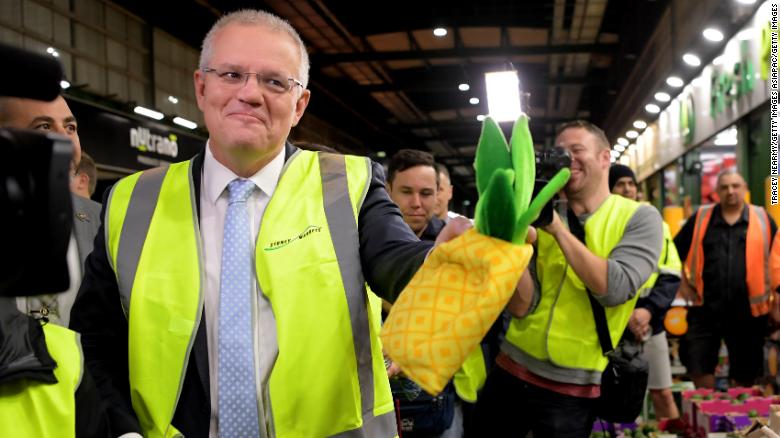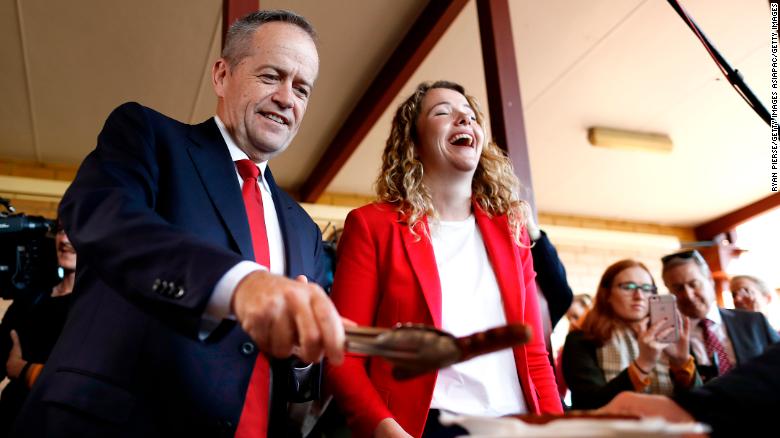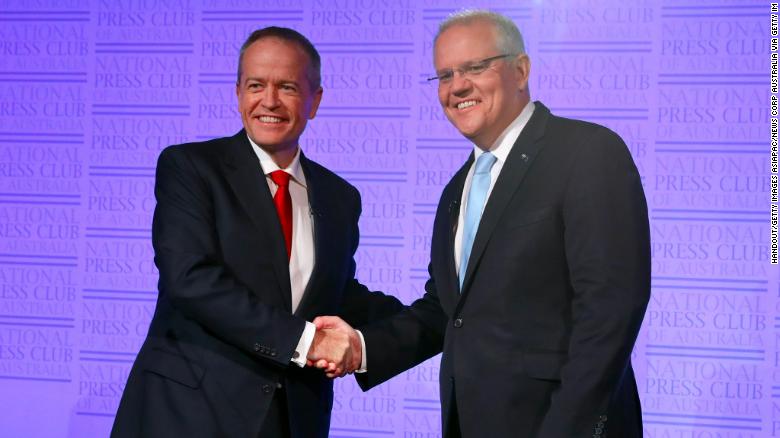Arrogant. Uninspiring. Out of touch. These are just some of the ways that Australian voters have described both of their prospective prime ministers in polls ahead of Saturday’s national election.
Australia doesn’t really like either its Prime Minister, Scott Morrison, or Opposition Labor leader Bill Shorten. In surveys of who would make a better leader, a full quarter of Australians can’t even pick between the two.
But with Australia one of the few countries in the world to have compulsory voting, they have to cast their ballot for someone on Saturday, which experts are saying could lead to a record third-party vote.
More than anything else, amid a merry-go-round of prime ministers and a lack of leadership, Australians are just fed up with both major parties, former Liberal Party leader John Hewson told CNN.
“Basically both parties are self-absorbed, scoring points on each other, inside the party or between parties, so basically all the big issues have just been left adrift,” he said.
“(Voters) are so cynical and they’ve had enough.”

A union man and a committed Christian
Voting is due to close at 6 p.m. local time in eastern Australia (4 a.m. ET), with the final ballots expected to be deposited two hours later in the west of the country.
Results should be known within a few hours of the booths closing. Polls taken shortly before the vote showed a tight race with a slight advantage to the center-left Labor Party.
Neither of the two competitors for Australia’s next prime minister has a high international profile — even the incumbent Morrison has only been in the job eight months.
Morrison is a former Tourism Australia chief executive and committed Pentecostal Christian who quickly gained a reputation across Australia as immigration minister in 2013 and 2014.
He claimed credit for stopping the refugee boats coming to Australia and effectively implementing the country’s notorious offshore detention centers, which human rights groups have described as “open-air prisons.”

His opponent, Bill Shorten, has been the Labor leader for almost six years. Shorten rose to power through the union movement, during which time he headed up the Australian Worker’s Union, one of the country’s largest.
But Shorten also brings baggage with him to the Saturday vote. As a powerful powerbroker in Labor’s center-right faction, Shorten was seen as one of the masterminds behind the toppling of Labor Prime Minister Kevin Rudd in 2010, an event which preceded nine years of leadership chaos across both parties. It earned him a reputation as “untrustworthy.”
Australians haven’t always distrusted their politicians. Former Labor Prime Minister Bob Hawke, who died on Thursday at the age of 89, was hugely popular during most of his time in power.
John Warhurst, emeritus professor of politics at the Australian National University, told CNN there was just a general lack of enthusiasm for these two current options.
“None of them have that indefinable popularity that someone like (former leaders) Malcolm Turnbull or Bob Hawke had, they don’t naturally make a very positive connection with the Australian community,” he said.

Leadership chaos
If Shorten wins to become Australia’s new prime minister, he would be the sixth leader in just over a decade.
The rapid changeover of prime ministers in party leadership contests has become a national and international joke, with some comparing Australia to other dysfunctional democracies like Italy and Greece.
Tony Abbott promised to end the leadership turmoil after he won the 2013 election. But less than two years later he was kicked out by his own party for Turnbull.
Turnbull narrowly won the 2016 national election against Shorten, only to be on the receiving end of the knife in August 2018, replaced with Morrison.
Former Liberal Party leader Hewson said the constant changes had not only eroded voter trust in politicians, but also pulled national attention away from issues important to Australia’s future.
“All the big issues have been left adrift, whether its housing affordability, or electricity prices, there’s been a whole lot of areas which probably need great structural reform,” he said.
Record-high voter dissatisfaction
In a survey after the 2016 election, the Australian National University found the country’s dissatisfaction with democracy was at an all-time high.
Of almost 3,000 voters interviewed, 40% said they were unhappy with Australia’s democracy, 56% said the government was run for a few big interests and a record 74% said people in government just “look after themselves.”
As more and more Australians grow dissatisfied, voters have been turning to minor parties in record numbers.
At the last election in 2016, more Australians cast ballots for a third-party candidate than at any time since the end of World War II. In the country’s upper house, the Senate, one in three votes was for neither the Labor party or the Liberal National coalition.
And recent polls suggest minor parties are unlikely to go away in the 2019 vote.
“They’re providing some relief valves for people who want to go anywhere but the major parties,” Warhurst said.
Election you may not want to win
Should Shorten win on Saturday, he will face a difficult battle to get his ambitious agenda through parliament. The Labor Party wants to take action on climate change, increase taxes on the wealthy and boost funding to schools and hospitals.
Morrison has pledged to keep the economy strong, slash debt and reduce taxes across the board.
But Hewson said neither side had addressed an important reality during campaigning — Australia’s slowing economy.
“The headwinds of our economy are very significant, there’s a lot of complacency and … you haven’t had a recession in over 20 years,” he said. “(But) you can’t rule it out in the next 12 to 18 months.”
As reported by CNN
